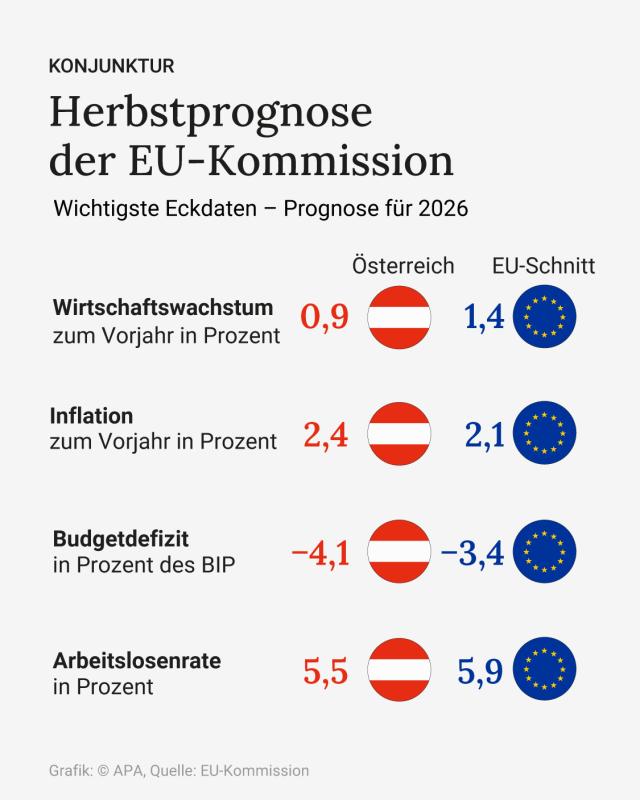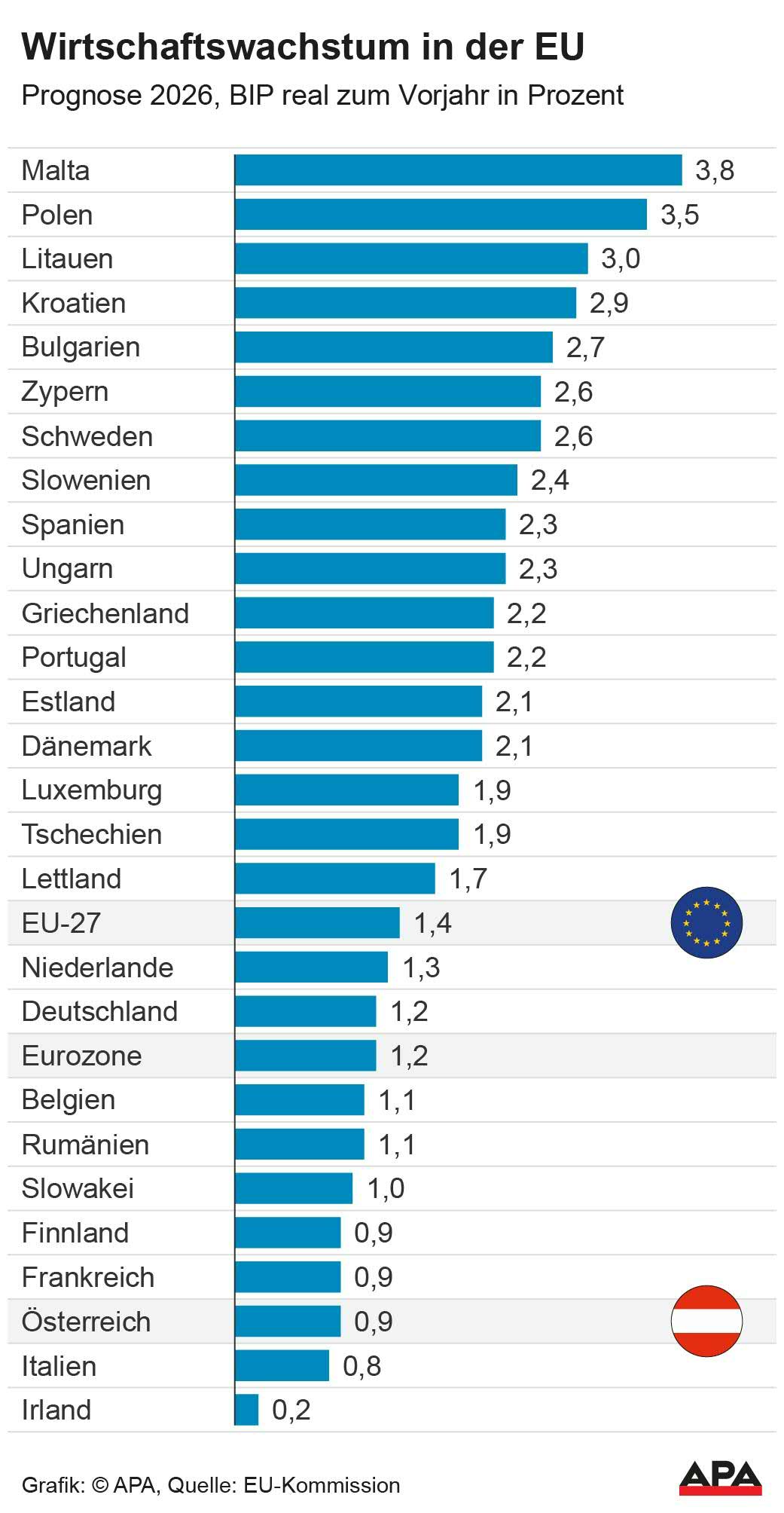Forecast: Austria 2026 Among EU's Laggards in Economic Growth

He warned that "trade policy decisions by the USA and the reactions of other major players like China would dampen global trade." The forecast assumes that "all tariffs introduced or credibly announced by the USA by the deadline" would apply throughout the forecast period. The uncertainty regarding trade policy remains high: "The impact of current tariffs and non-tariff trade barriers on the European economy could be greater than expected," said Dombrovskis.

Loud Calls for Bureaucracy Reduction
"We must consider the location issue holistically, as our entrepreneurs are very export-oriented," commented European Minister Claudia Plakolm (ÖVP) on the poor forecast for Austria on Monday in Brussels. "Primarily, we export and trade with our EU neighbors and EU member states." She therefore calls for "tangible results and noticeable relief" in reducing bureaucracy. Bureaucracy costs "an incredible amount of money," said the minister. "However, we need a strong location if we want to tackle the challenges of the future."

The FPÖ economic spokesperson NAbg. Barbara Kolm criticized the ÖVP European Minister on Monday afternoon. "Plakolm's demand for 'tangible results' in reducing bureaucracy is correct, but exactly what the FPÖ has been demanding for a long time and consistently," she stated via press release. Austria is in the midst of a dangerous economic stagnation and will - "due to the completely overwhelmed black-red-pink loser coalition" - unfortunately remain the economic laggard in Europe for longer.
On a positive note, the European Parliament has already presented an ambitious debureaucratization agenda - "with a strong position on supply chain and sustainability reporting obligations, which bring real relief for Europe's companies," noted the ÖVP economic spokesperson in the European Parliament, Angelika Winzig. "For all companies, it is now crucial that unnecessary bureaucracy is finally rigorously reduced and support for innovative companies is provided simply and effectively." Better access to financing as well as available and affordable energy are "indispensable" for a competitive economy in Europe.
Federation of Austrian Industries Speaks of "Wake-Up Call"
The fact that Austria is once again among the growth laggards is, according to the Federation of Austrian Industries (IV), another "wake-up call" for necessary structural reforms. "In combination with a persistently high budget deficit, the findings show that our location is losing momentum in international comparison," warns IV Secretary General Christoph Neumayer of an "upswing illusion."
His points of criticism: High unit labor costs, above-average inflation, expensive energy, and massive regulatory effort, which noticeably burden competitiveness. "It is therefore crucial to finally achieve measurable progress in reducing bureaucracy and to relieve the labor factor," he demanded a modern, efficient state, "that gets its expenses under control, reduces costs, and enables innovations."
(APA/Red)
EU-Kommissar Dombrovskis warnt vor Unsicherheiten
Der zuständige EU-Kommissar Valdis Dombrovskis betonte in der Pressekonferenz, dass die Schulden- und Defizitquoten in einigen Mitgliedstaaten leicht steigen dürften: "Wir müssen wachsam bleiben, um die finanzielle Stabilität zu gewährleisten." Er betonte, dass die heutige Prognose "erheblicher Unsicherheit" unterliege. Die Anstrengungen zur Steigerung der Wettbewerbsfähigkeit und zur Erschließung des vollen Wachstumspotenzials Europas müssten verdoppelt werden, forderte der Lette.
Er warnte davor, dass "handelspolitische Entscheidungen der USA und die Reaktionen anderer wichtiger Akteure wie China den Welthandel dämpfen" würden. Die Prognose gehe davon aus, dass "alle Zölle, die von den USA bis zum Stichtag eingeführt oder glaubwürdig angekündigt" wurden, während des gesamten Prognosezeitraums gelten würden. Die Unsicherheit hinsichtlich der Handelspolitik bleibe hoch: "Die Auswirkungen der aktuellen Zölle und nichttarifären Handelshemmnisse auf die europäische Wirtschaft könnten größer sein als erwartet", so Dombrovskis.
Laute Rufe nach Bürokratieabbau
"Wir müssen das Thema Standort ganzheitlich betrachten, denn unsere Unternehmerinnen und Unternehmer sind sehr stark exportorientiert", kommentierte Europaministerin Claudia Plakolm (ÖVP) die schlechte Prognose für Österreich am Montag in Brüssel. "In erster Linie exportieren und handeln wir mit unseren EU-Nachbarn und EU-Mitgliedstaaten". Sie fordert daher "spürbare Ergebnisse und spürbare Entlastungen" beim Abbau von Bürokratie. Bürokratie koste "unglaublich viel Geld", so die Ministerin. "Wir brauchen aber einen starken Standort, wenn wir die Herausforderungen der Zukunft stemmen wollen."
Die FPÖ-Wirtschaftssprecherin NAbg. Barbara Kolm übte Montagnachmittag Kritik an der ÖVP-Europaministerin. "Plakolms Forderung nach 'spürbaren Ergebnissen' beim Bürokratieabbau ist zwar richtig, aber genau das verlangt die FPÖ schon lange und konsequent", teilte sie via Aussendung mit. Österreich stecke mitten in einer gefährlichen wirtschaftlichen Stagnation und werde - "aufgrund der völlig überforderten schwarz-rot-pinken Verlierer-Koalition" - leider noch länger wirtschaftliches Schlusslicht in Europa bleiben.
Positiv sei, dass das Europäische Parlament bereits eine ambitionierte Entbürokratisierungsagenda vorlege - "mit einer starken Position zu den Lieferketten- und Nachhaltigkeitsberichtspflichten, die echte Entlastungen für Europas Unternehmen bringen", hielt die Wirtschaftssprecherin der ÖVP im Europaparlament, Angelika Winzig, fest. "Für alle Unternehmen ist es jetzt von entscheidender Bedeutung, dass unnötige Bürokratie endlich rigoros abgebaut wird und Unterstützung für innovative Betriebe unkompliziert und wirksam erfolgt." Ein besserer Zugang zu Finanzierung sowie verfügbare und leistbare Energie seien für eine wettbewerbsfähige Wirtschaft in Europa "unverzichtbar".
Industriellenvereinigung spricht von "Weckruf"
Dass sich Österreich erneut unter den Wachstumsschlusslichtern befindet, ist laut Industriellenvereinigung (IV) ein "weiterer Weckruf" für notwendige Strukturreformen. "In Kombination mit einem anhaltend hohen Budgetdefizit zeigt der Befund, dass unser Standort im internationalen Vergleich weiter an Dynamik verliert", warnt IV-Generalsekretär Christoph Neumayer vor einer "Aufschwungsillusion".
Seine Kritikpunkte: Hohe Lohnstückkosten, überdurchschnittliche Inflation, teure Energie und ein massiver regulatorischer Aufwand, welche die Wettbewerbsfähigkeit spürbar belasteten. "Es ist daher zentral, etwa beim Bürokratieabbau endlich messbare Fortschritte zu erzielen und den Faktor Arbeit zu entlasten", forderte er einen modernen, effizienten Staat, "der seine Ausgaben in den Griff bekommt, Kosten reduziert und Innovationen ermöglicht".
(APA/Red)
This article has been automatically translated, read the original article here.
Du hast einen Hinweis für uns? Oder einen Insider-Tipp, was bei dir in der Gegend gerade passiert? Dann melde dich bei uns, damit wir darüber berichten können.
Wir gehen allen Hinweisen nach, die wir erhalten. Und damit wir schon einen Vorgeschmack und einen guten Überblick bekommen, freuen wir uns über Fotos, Videos oder Texte. Einfach das Formular unten ausfüllen und schon landet dein Tipp bei uns in der Redaktion.
Alternativ kannst du uns direkt über WhatsApp kontaktieren: Zum WhatsApp Chat
Herzlichen Dank für deine Zusendung.








